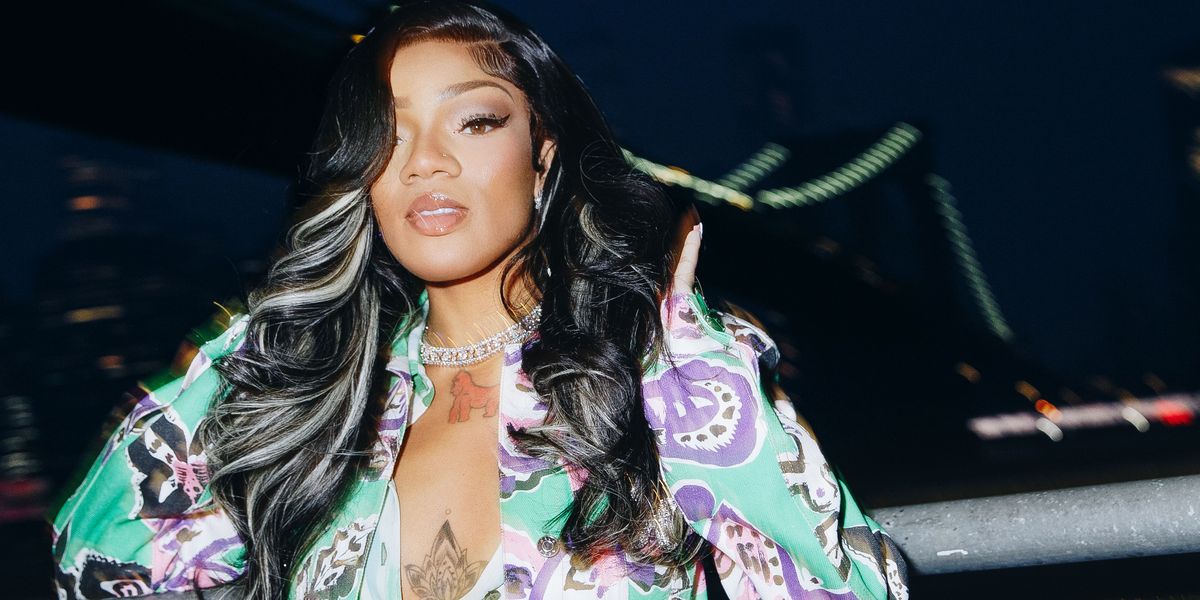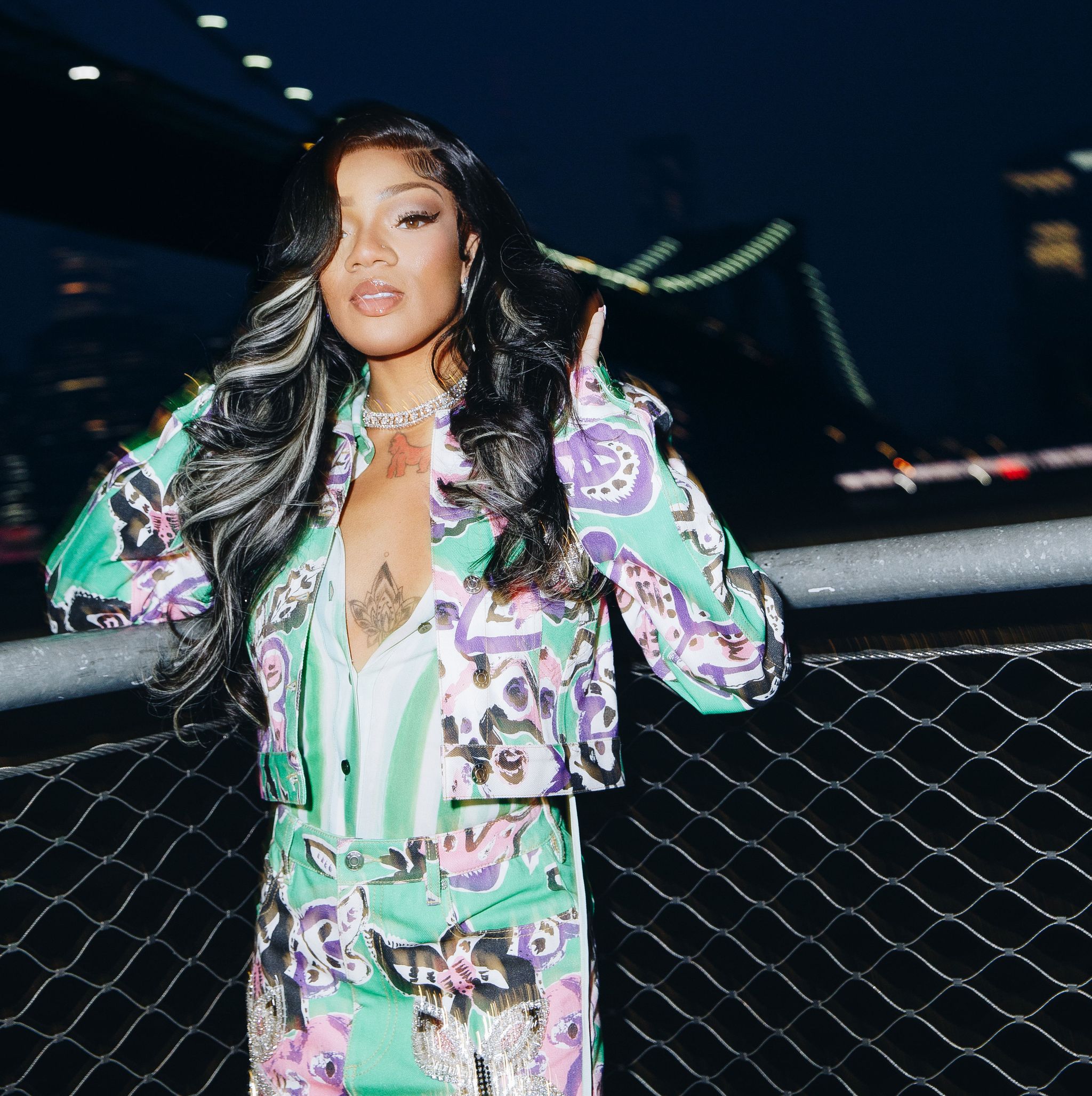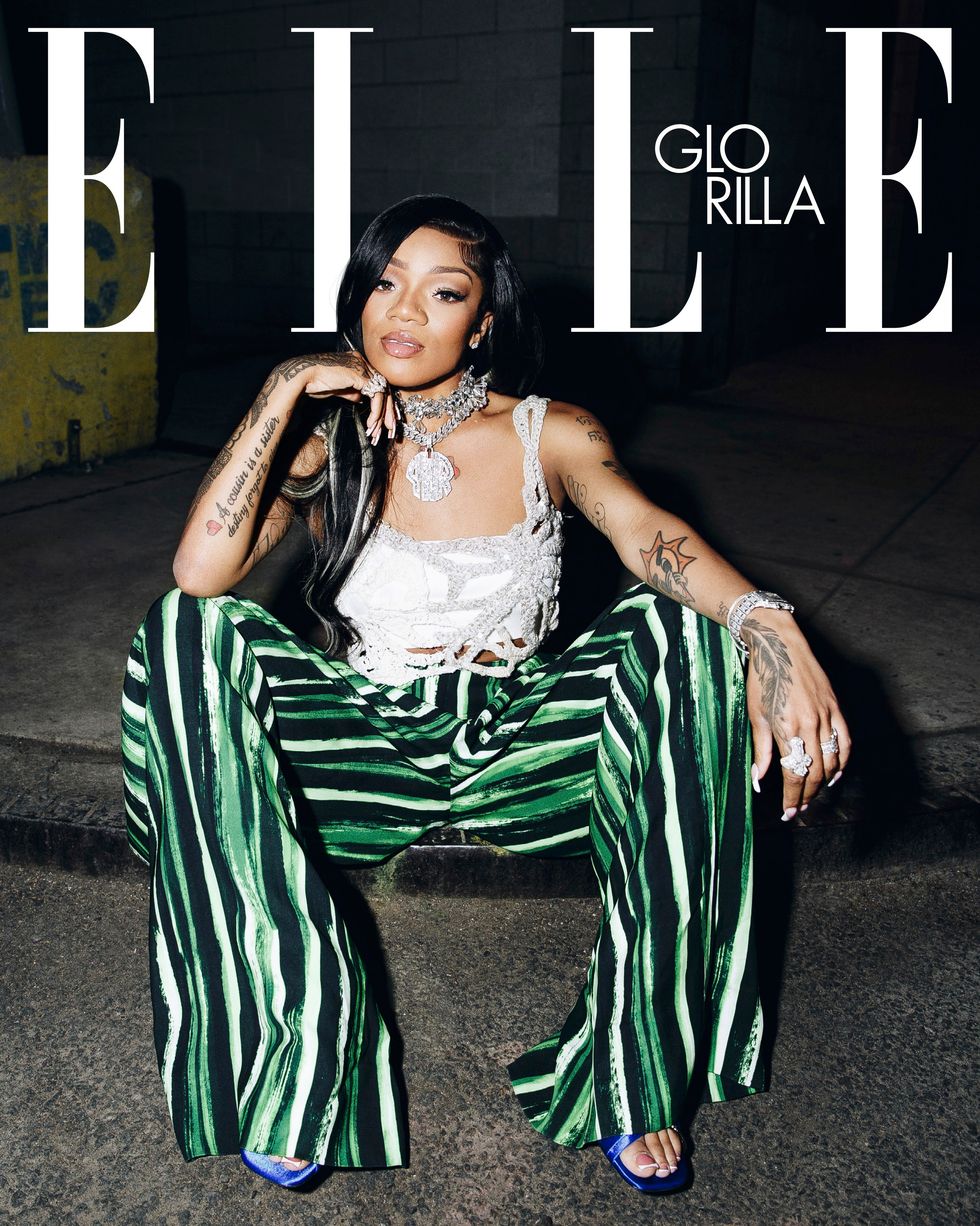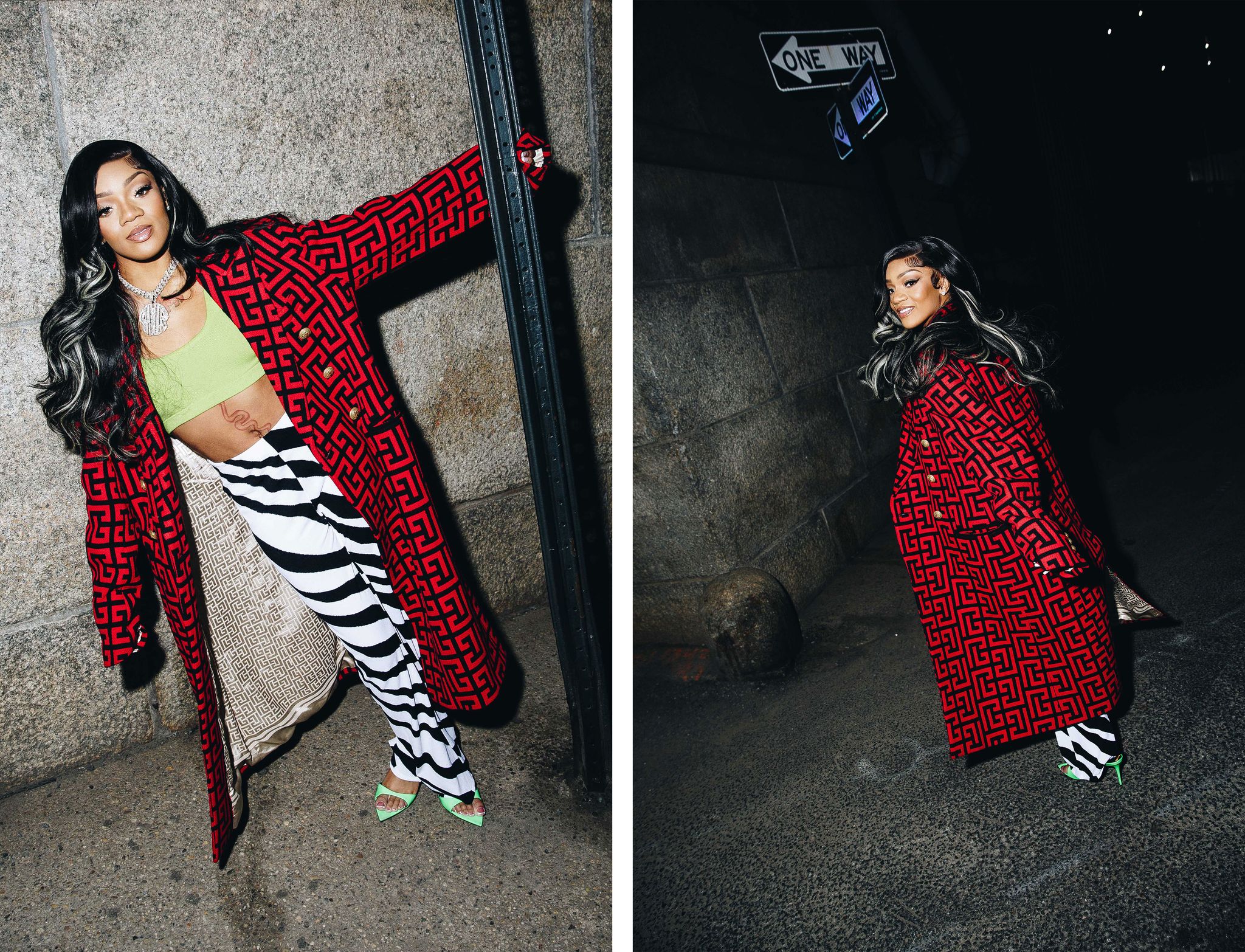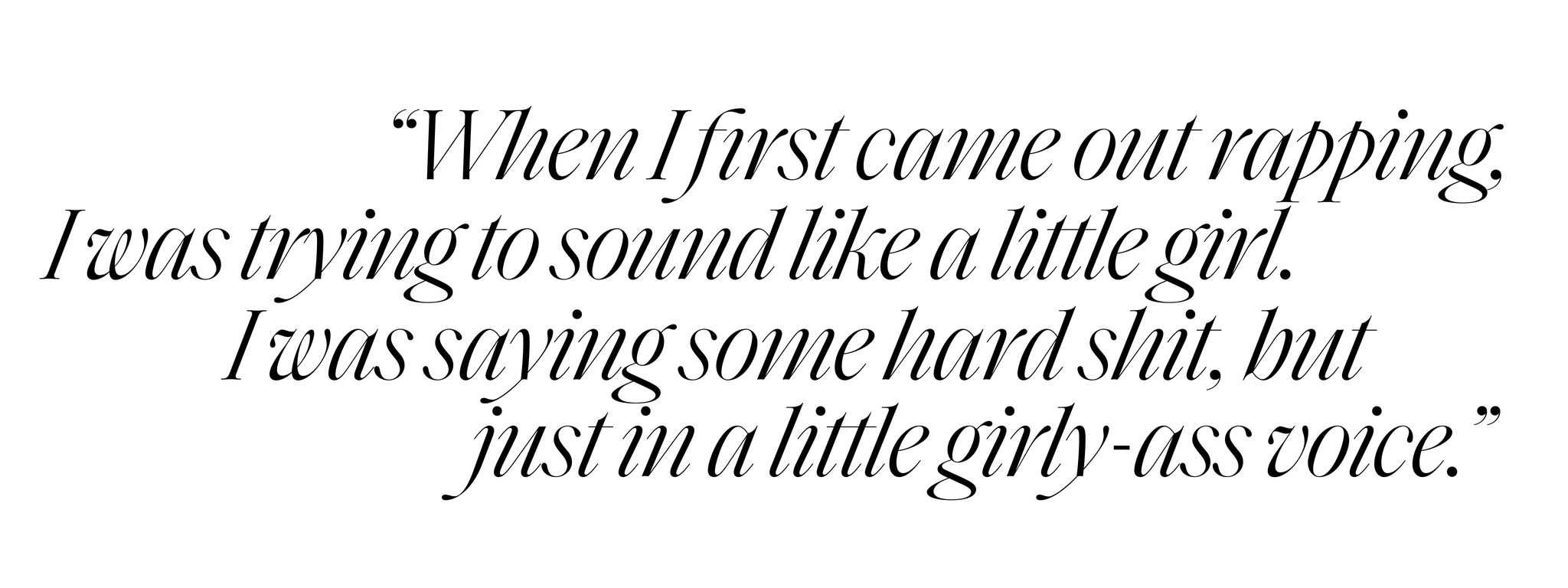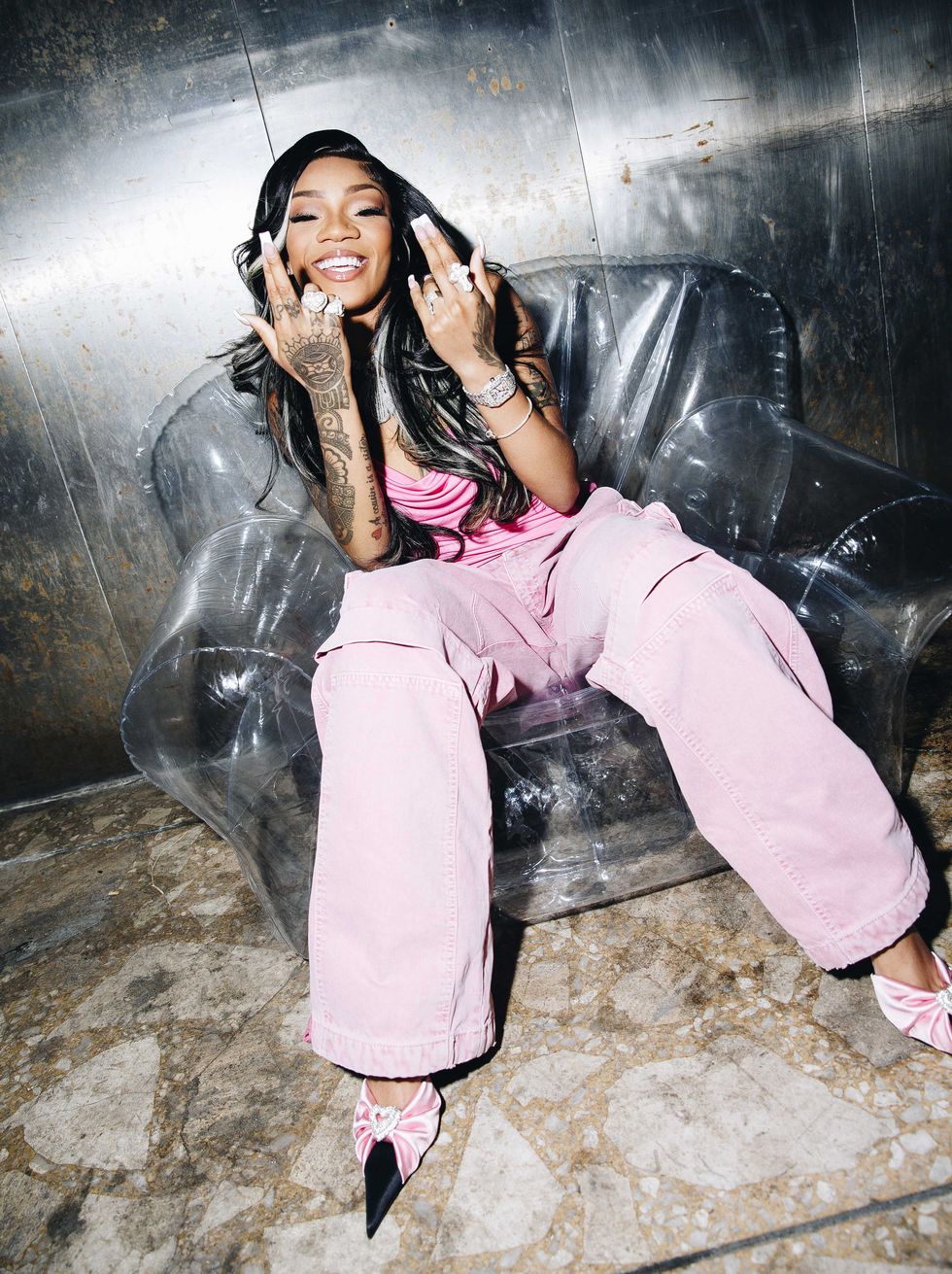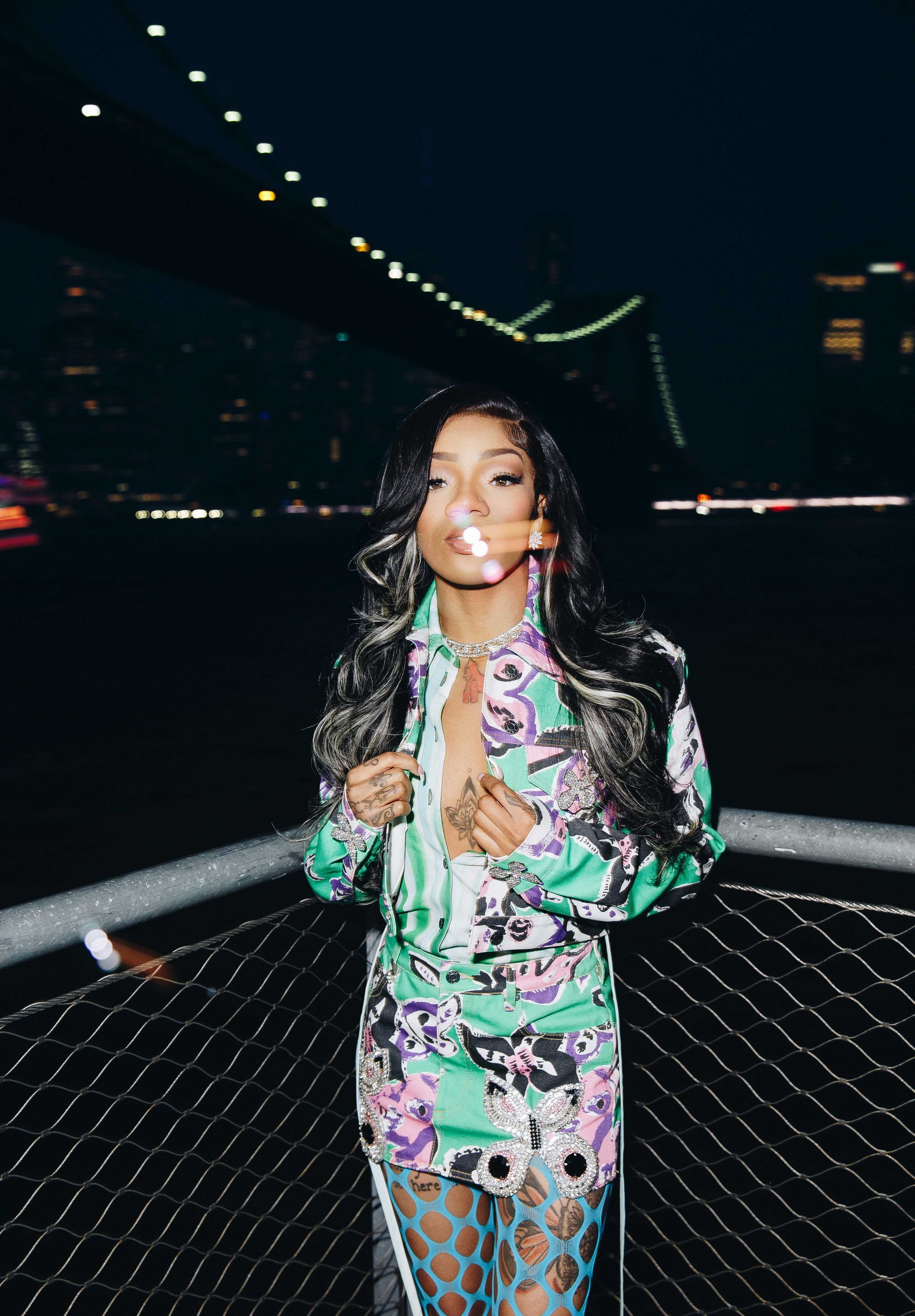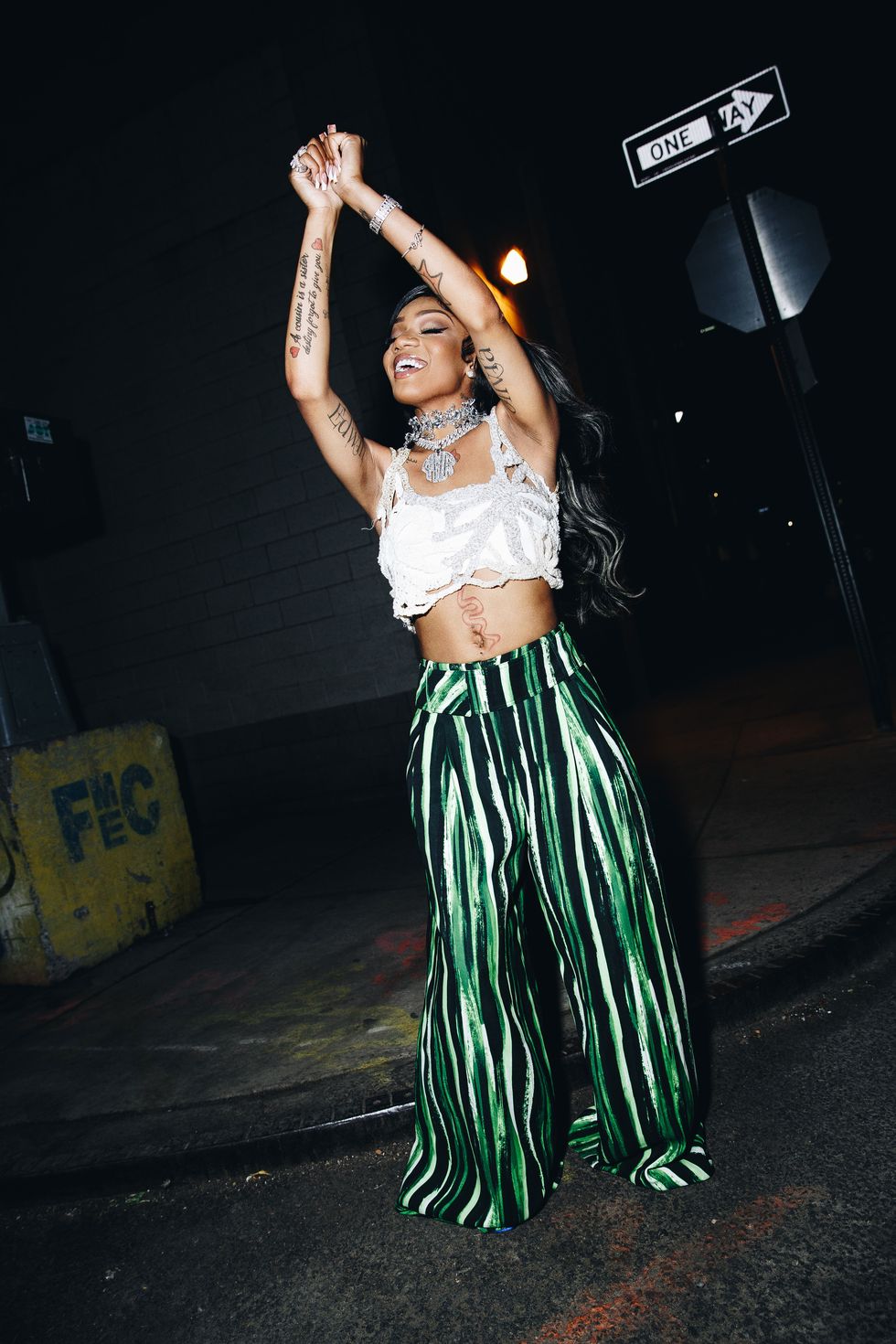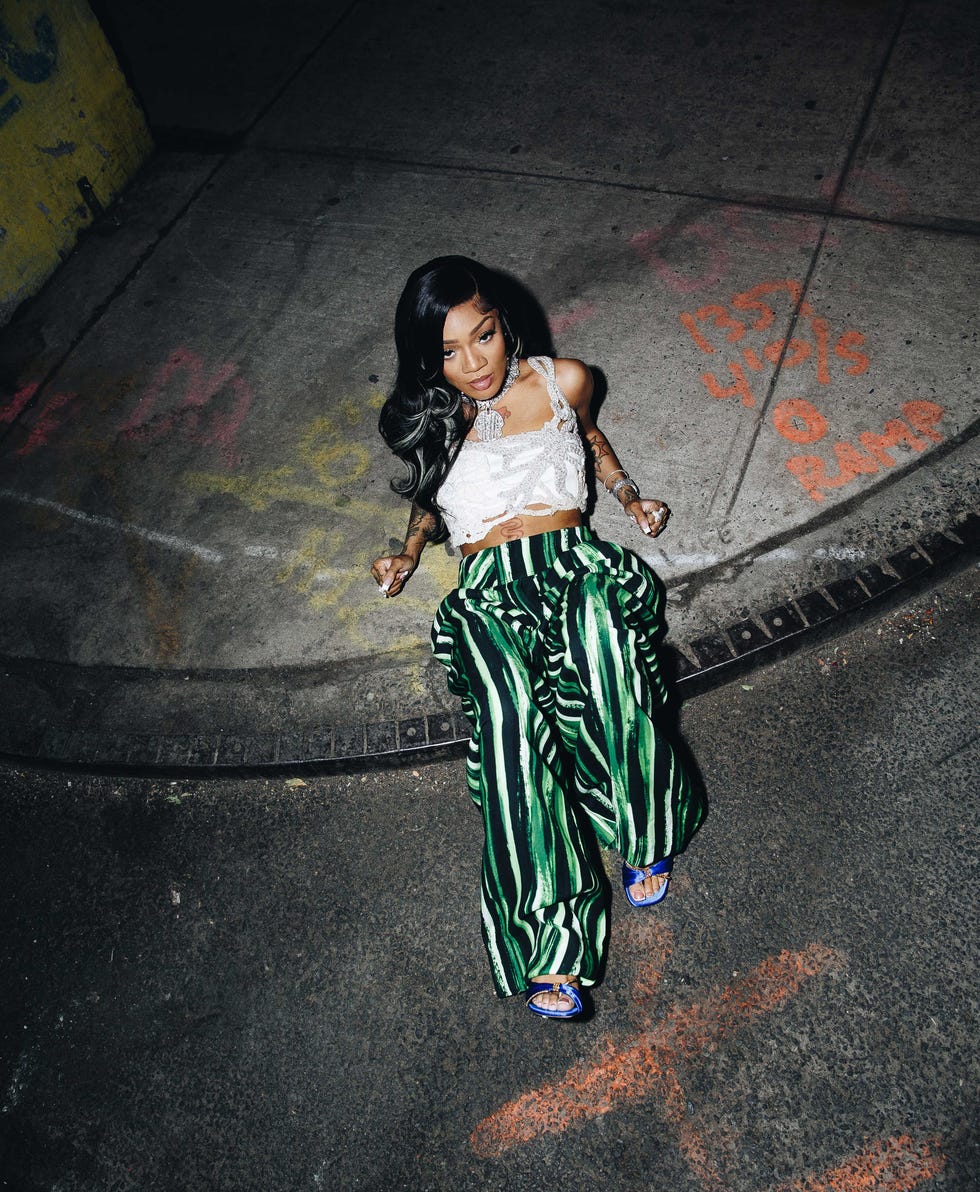As the late, great Aaliyah once said, “If at first you don’t succeed, then dust yourself off and try again.” This rings especially true for GloRilla, a rising star in hip-hop, who cites the R&B icon as one of her inspirations. Take, for instance, when a cheating ex inspires an anthemic, spelling bee-like romp that declares you’re “F-R-E-E, fuck nigga free” and rapidly becomes a smash hit. Or the moment when logistical hiccups curtail your solo Hot 97 Summer Jam 2023 performance, prompting you to put your career goals aside and graciously join forces with Cardi B during her set to deliver a captivating performance of yet another one of your hits. Stadium traffic, backstage drama, and scheduling miscommunication all threatened to put a damper on GloRilla’s mood this particular Sunday afternoon at the UBS Arena on Long Island, but the 23-year-old Memphis rapper (who will turn 24 on July 28) seems to find the silver lining in just about every situation. In GloRilla’s world, there’s always reason to try again, fuckboy or festival mishap be damned.
Hanging out with GloRilla and her entourage feels like scoring an invite to an intimate family BBQ. It’s a cloudy day in New York, and the backstage guest suite where the rapper and her crew are tucked away has all the trappings of a cookout. We’re all sunken into leather couches commenting on the night’s performances, the gaiety of what started off as a rather celebratory day dwindling as we anxiously await her new call time. Smoke from blunts held in Glo’s superbly polished hands permeates the air on one side of the room; swigs of Taylor port wine are gulped between the sets displayed on the wide-screen TV propped up in the middle of the space. On the menu is an assortment of chips and a cheese plate.
Bellowing laughs punctuate conversations and intensify depending on the visitor. GloRilla drums up a playful chuckle when Hot 97’s Ebro in the Morning host Ebro Darden stops by for a check-in; slaps and wails offer support to her howl when fellow rappers Sexxy Red and Kaliii join her pre-show turn-up crew, which also consists of rapper and former reality TV personality ChriseanRock. Fellow Memphis rapper NLE Choppa stops by and comments on how “thick” she is—a humorous tease GloRilla often uses to compliment her own svelte figure—and a light jog is added to emphasize the joke. Trivial conflicts between women in hip-hop have become par for the course, but GloRilla proves that nothing beats having a community rich in camaraderie.
I meet up with GloRilla for our actual chat two days later, at Kick Axe Throwing in Brooklyn, a bar with, yes, axe-throwing on the premises. Glo tells me she has never thrown an axe before, but she’s up for the challenge. The rules are simple: Stand behind the white line drawn on the wooden floor, and grip the axe with your dominant hand while the other hand rests on top. Tip the axe back enough to touch the top of your shoulder, and toss like you mean it. Glo’s team takes turns at the range; her publicist’s attempt flies against the cage with a loud clang. “You’re not angry enough,” the instructor tells her. She eventually finds her footing, and another contender notches a few points on the first go. GloRilla, for her part, also nails it right away. Little does their axe-wielding coach know the petite rapper with the infectious laugh doles out simmering gut punches with a gleaming, pearly-white Southern smile. Make no mistake: Nothing about this woman suggests fragility. Born in Frayser, a neighborhood in North Memphis, Gloria Hallelujah Woods was destined for greatness from the start. “My grandma’s name is Gloria Woods, and my momma added Hallelujah. [My mom] said that was just how she was feeling, like she blessed me [already],” she recalls. In the Woods household, Yolanda Adams, Kirk Franklin, and Smokie Norful were in heavy rotation. Asked about her favorite gospel song, Glo starts singing Tasha Cobbs’ “Break Every Chain.”
“We were a religious, Christian household. We went to church every Sunday,” she says, adding that she was on the praise-and-worship team and sang in the choir. “My momma was real strict, and I feel like it played a part in how we used to act at school,” she notes. GloRilla was homeschooled until the fifth grade, when she began attending public school, and she struggled to acclimate to being around kids outside of church. She found relief in “acting like an ass” to shut down any narrative of her being “the quiet one.” Even then, she had a lot to say; it was only a matter of time before she found her voice.
Once she hit public school, the trading of worlds began: heavenly gospel refrains for Chief Keef-inspired bars; butter-smooth vocals for a raspy, smoke-laced drawl; and her strict Christian mother for the laid-back, cool dad who let her run freely. GloRilla moved in with her father, who lived just 20 minutes or so outside Frayser, at about age 15, and she began listening to rap heavily, which made her feel invincible.
“When I used to do badass shit, I used to listen to Chief Keef while I was doing it. He used to motivate me to do bad shit. But the shit I used to be doing, he was rapping about, so I’m like, ‘Damn. I relate to everything he’s saying.’ I just liked his energy. He was just so young and turnt and he didn’t give a fuck. Nobody else sounded like him,” she says.
Empowered by the support of her cousin—who also gave her the name GloRilla—and a series of jobs that funded her studio sessions (“I worked at Nike, FedEx, Checkers, Walmart. I had a couple jobs,” she says), Glo began to spend countless hours recording, unleashing songs aimed at establishing her reputation in the Memphis area—on screens (Facebook proved to be a fruitful social platform for the then-budding rapper) and off. She quickly hit the tri-state—Arkansas, Mississippi, and Tennessee—“That’s where my crowd was at,” she says. Her influences expanded to local legends like Three 6 Mafia, Yo Gotti, Moneybagg Yo, and the late Gangsta Boo. “Memphis is rough, so that made us rough. You can hear the roughness in our music,” she says matter-of-factly. “It’s ghetto—super ghetto. There are a lot of bandos in my neighborhood. Out there, houses get broken into a lot. They break into houses a lot. Fights, you know, the regular ghetto.”
At first, GloRilla struggled to strike a balance between embracing her femininity and asserting her unwavering Southern grit. The seething lyrics on deceitful dudes and friends were there, but the “cutesy” voice she was trying to adopt felt forced. She knew it, her friends heard it—and you can hear it, too. On her earliest mixtape, Most Likely Up Next, GloRilla soars into a high-pitched shriek on songs like “Trust Issues” and “Turn Up.”
“When I first came out rapping, I was trying to sound like a little girl. I was saying some hard shit, but just in a little girly-ass voice. It was me trying to change my sound because I have a naturally deeper voice. I was kind of embarrassed, because I wanted to sound like a girl,” she admits. She decided to switch things up in 2021. “That’s when I first changed my sound. That’s the year my voice started getting deeper and deeper.”
What makes GloRilla’s music so alluring is that, unlike many rappers today, she acts her age. “Outside hanging out the window with my ratchet-ass friends,” she raps on her 2022 breakout single “F.N.F (Let’s Go),” eventually featured on her debut EP with Collective Music Group (CMG), the Memphis-bred record label founded by Yo Gotti. A beat that was originally created with Megan Thee Stallion in mind serendipitously landed in her waiting hands. “I was in the car with my cousin when Hitkidd hit me up to go to the studio. I’m like, ‘What are you hearing on here?’ Sometimes he’ll give me an idea, but he couldn’t think of anything. I was just in the car smoking, and then it just came to me: ‘What can I put on this beat to be hard?’ Then it literally just came,” she recalls. “It was supposed to be [about being] free. I’m done with that.” After recording the song, she needed to maximize its potential, so she shot a quick parking-lot video with a bunch of her friends—shaking and slapping ass, jookin, and throwing up middle fingers to the song’s subjects. Rule number one in GloRilla’s rulebook? Men are disposable, real friends are forever. Rule number two? Why stress over the problems of today, when tomorrow’s a new day?
It’s the premise of the Cardi B-assisted “Tomorrow 2,” which arrived in September 2022 with an accompanying video of GloRilla and her friends—you guessed it—hanging out the windows of cars and touring NYC landmarks like a bodega, the subway, and the streets, before making their way to the Bronx to meet Cardi. The two hurl barbs at fake friends and dishonest lovers, delivering a maddeningly catchy song chanted by women everywhere. “Every day the sun won’t shine, but that’s why I love tomorrows,” GloRilla raps like an evangelist at the pulpit on Summer Jam Sunday, to a roaring stadium belting out every line of “Tomorrow 2” with gusto, while Cardi B stands on an elevated stage behind Glo rapping along like a proud cousin. It’s why her 3.6 million Instagram fans await her every move. Her formula consists of sticky, chant-like raps about men, money, looking good, and hanging out with her girls, who serve as supporting characters in almost every music video she releases. Her message is simple: “Be independent. Have fun. Live your life. Don’t let no nigga be the reason that you hate yourself. Have self-love,” she preaches while on a quick break from axe-throwing.
Rather than a forced debut, GloRilla’s EP Anyways, Life’s Great…, released in November 2022, serves as a compelling status report, showcasing the undeniable emergence of her star power. She maintains her vibrant spirit across the nine-track project, skillfully transitioning into a more introspective tone on songs like “No More Love,” where she candidly reflects on her experience with abortion. In the thought-provoking “Out Loud Thinking,” which spans nearly three minutes, she gently reminds listeners to check on their strong friends. There are sultry bops, too; her newest song, “Lick or Sum,” co-produced by Juicy J and Derrick Milano, reimagines Three 6 Mafia’s ’90s classic “Slob on My Knob” as a women’s manifesto on how to be pleased.
“You see [with] the EP, three, four of the songs I wrote before I got into the industry—that was me being me fresh into the industry,” she explains. “This [new album] is going to be still me, still raw and uncut. But just me knowing what it’s like being here and [experimenting with] different sounds. Because I was on my hood shit the whole time. This go-around, it ain’t just me being hard. I got a couple of different sounds coming on this one.”
Elsewhere in “Out Loud Thinking,” GloRilla raps that her “eyes so on the prize right now that I don’t wanna blink.” What that prize looks like now—after signing to CMG, a Grammy nod, and back-to-back hits—is further domination, maybe an Afrobeat or Latin crossover song, and “more accolades, more awards, more accomplishments, more plaques. More me,” she says.
“The initial prize was me getting to where I am right now,” GloRilla says, her posture on the couch more relaxed than before and the intensity in her slightly-red gaze now shifting, courtesy of a blunt she smoked on her way to our session settling in deeper. She glances over at the cage where her team is relentlessly honing its axe-throwing skills. “My friend and I recently had a conversation about how we are so focused on our future—what else can we do to be better than what we’re doing now? We forget that what we got right now is what we’ve [always] prayed for.”
Photographed by Tyrell Hampton; styled by Rúben De Melo Moreira; hair by Tokyo Stylez at Chris Aaron Management; makeup by Sadai Banks; nails by Alex Smith; produced by Petty Cash Production.
Beauty Commerce Editor
Nerisha is the beauty commerce editor at ELLE.com, covering all things beauty (and fashion and music). She has a penchant for sneakers and nude lip glosses, and spends way too much time re-watching 90s sitcoms.
